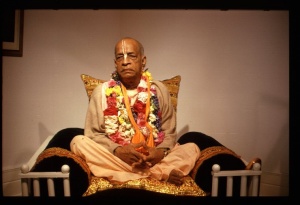CC Madhya 20.275

A.C. Bhaktivedanta Swami Prabhupada
TEXT 275
- kāla-vṛttyā tu māyāyāṁ
- guṇa-mayyām adhokṣajaḥ
- puruṣeṇātma-bhūtena
- vīryam ādhatta vīryavān
SYNONYMS
kāla-vṛttyā — in due course of time, as the immediate cause of creation; tu — but; māyāyām — within the material nature; guṇa-mayyām — full of the three material modes of nature (sattva-guṇa, rajo-guṇa and tamo-guṇa); adhokṣajaḥ — the Supreme Personality of Godhead, who is beyond material conceptions; puruṣeṇa — by the enjoyer of material nature; ātma-bhūtena — who is an expansion of His personal self; vīryam — semen; ādhatta — placed; vīryavān — the omnipotent.
TRANSLATION
“‘In due course of time, the Supreme Personality of Godhead [Mahā-Vaikuṇṭhanātha], by the agency of an expansion of His personal self [Mahā-Viṣṇu], placed the seed of the living entities within the womb of material nature.’
PURPORT
This is a quotation from Śrīmad-Bhāgavatam (SB 3.5.26). This verse tells how the living entities come in contact with material nature. Just as a woman cannot beget children without uniting with a man, material nature cannot beget living entities without being in union with the Supreme Personality of Godhead. There is a history of how the Absolute Lord becomes the father of all living entities. In every system of religion, it is accepted that God is the supreme father of all living entities. According to Christianity, the supreme father, God, provides the living entities with all of life’s necessities. Therefore they pray, “Give us this day our daily bread.” Any religion that does not accept the Supreme Lord as the absolute father is called kaitava-dharma, or a cheating religion. Such religious systems are rejected in Śrīmad-Bhāgavatam (SB 1.1.2): dharmaḥ projjhita-kaitavo ‘tra. Only an atheist does not accept the omnipotent supreme father. If one accepts the omnipotent supreme father, he abides by His orders and becomes a religious person.